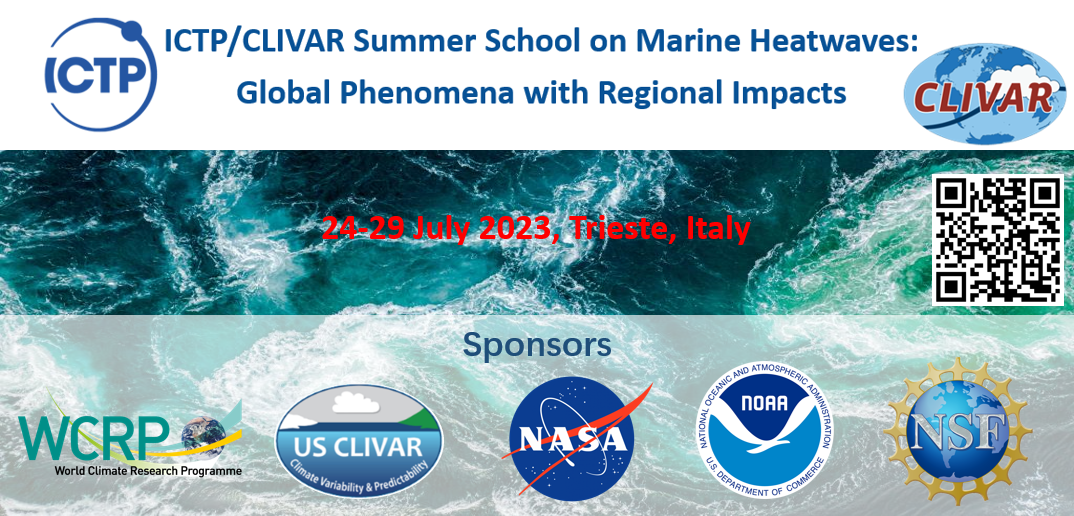ICTP/CLIVAR Summer School on Marine Heatwaves: Global Phenomena with Regional Impacts

Click here to see the draft programme
Background
Marine Heatwaves (MHWs) are extreme climatic events that impact all ocean basins and can persist from weeks to months and spread over hundreds to thousands of kilometers. MHWs have devastating impacts on marine habitats and ecosystems and influence regional weather systems such as the monsoons and extreme weather events like tropical cyclones. Climate change is clearly responsible for increasing the frequency of the widespread occurence of MHWs, but open questions remain about the internal variability that drives these extreme events above the slowly evolving background warming. To this end, ICTP-CLIVAR Summer School on 'Marine Heatwaves: Global Phenomena with Regional Impacts' will be jointly organized by CLIVAR and ICTP in July 2023 at Trieste, Italy. The Summer School aims to enhance the understanding of the mechanisms, predictability and impacts of MHWs, as well as to provide hand-on experience and tools to enhance the capacity of early career scientists (ECS) from under-resourced countries for detecting and predicting MHWs. The summer school generates pan-CLIVAR interest with cross-panel representation on the organizing committee.
The summer school will be organized over a 6-day period as primarily an in-person event. Should Covid-related safety considerations limit some participants to travel to Trieste, plans will be made to enable their participation virtually. The ICTP facility is well set-up to host virtual meetings including equipment and IT support. The school will include not only lectures on the current state of knowledge on the topic of MHWs, but also practical sessions with the development of student projects to provide a hands-on approach to the understanding of the material presented in the lectures. In particular, analysis tools for the detection and diagnosis of these extreme events in observations and climate model output will be made available to the students prior to the school, so that they can be readily applied to small research projects during their time in Trieste. We also plan to have short presentations given by the students to share their research and give them an opportunity to be able to organize and share their science findings with all other participants.
Time
24-29 July 2023
Venue
Useful Information
- Reading Materials: https://www.clivar.org/mhw-summer-school-reading-material
- Programe (Slides & recordings): http://www.clivar.org/mhw-summer-school-draft-programme
- Grouping for in-person participants: https://www.clivar.org/marine-heatwaves-summer-school-grouping
- Poster instructions: The format of the poster is usually A0 portrait (fits better our boards: (84.1 cm x 118.9 cm) or (33.1 inches x 46.8 inches)), but can be A1 or landscape format.
Application
Application closed. The deadline on 1 April 2023. Applicants should submit a 'Research Abstract' (<1 page) highlighting their recent relevant research. A number of abstracts will be selected for a contributed talk or for a poster session. During the application, please make sure to use the template to format your abstract.
A limited number of grants are available to support the attendance of selected participants, with priority given to participants from developing countries. There is no registration fee.
Programme
The 6-day summer school will cover the following topics concerning MHWs, that will be divided into four primary themes – detection, mechanisms, impacts, and future projections. It is expected that each theme would be allotted one day, to include invited lectures, hands-on training and student presentations, with the remaining 2 days dedicated to a synthesis of each theme, including an overall recap of the theme and student project presentations that stem from their hands-on sessions at the school.
Day 1: Technical aspects: Methodologies used to estimate extremes, etc.
This thematic session will cover definitions of MHW and their identification using readily-available online data sources and global forecast models.
Lecturers: Robert Schlegel, Dillon Amaya, Amandine Schaeffer
Day 2: Drivers of marine heatwaves: Atmospheric and oceanic mechanisms.
For mechanism, lectures will discuss the current state-of-understanding of formation of MHWs in different parts of the world and identify where there are gaps in our understanding.
Proposed lecturers: Neil Holbrook, Antonietta Capotondi, Regina Rodrigues, Simona Masina
Day 3: Impacts of marine heatwaves: Cyclones, ecosystems, societal costs.
For impacts, lectures will cover how MHWs influence ecosystems and climate, and additionally discuss what observing systems could be put in place - especially in developing countries - to fill the gaps in global marine observational networks that could improve and improve advanced warning by prediction and potential mitigation options.
Proposed lecturers: Nicole Lovenduski, Kathryn E. Smith, Roxy Koll
Day 4: Future projections, attribution and forecast: trends vs internal dynamics.
For future projections, we will use global climate models to explore how MHWs will change in a warming world, as a result of both the climate change trend and internal variability.
Proposed lecturers: Thomas Froelicher, Clara Deser
Day 5: Synthesis and recap (1): including an overall recap of the theme and student project presentations that stem from their hands-on sessions at the school.
Day 6: Synthesis and recap (2): including an overall recap of the theme and student project presentations that stem from their hands-on sessions at the school.
The programme for the summer school is available here.
Lecturers
Organizing Committee
Shikha Singh (shikha@tropmet.res.in), IORP, OC Co-chair
Janet Sprintall (jsprintall@ucsd.edu), IORP, OC Co-chair
Juliet Hermes (jc.hermes@saeon.nrf.ac.za), IORP
Roxy Mathew Koll (roxy@tropmet.res.in), IORP
Antonietta Capotondi (antonietta.capotondi@noaa.gov), PRP
Cristian Martinez-Villalobos (cristian.martinez.v@uai.cl) PRP
Regina R. Rodrigues (regina.rodrigues@ufsc.br), ARP
Riccardo Farneti (rfarneti@ictp.it), ICTP
Jing Li (jing.li@clivar.org), ICPO











Add new comment